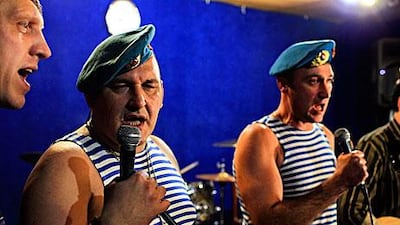MOSCOW // The most popular protest song in Moscow today comes from burly men in blue berets, unlikely heroes of a peaceful middle-class movement challenging the rule of Vladimir Putin.
The simple but catchy song was performed at a protest rally for the first time this weekend, but many of the tens of thousands in the crowd already knew the words.
On a snowy square across a frozen river from the Kremlin, the protesters sang along with the chorus, which sums up their weariness with Mr Putin as he intends to extend his 12 years in power by winning a presidential election in March:
"You're just like me, a man not a god. I'm just like you, a man not a sod."
The former paratroopers' song is just one of the many musical, literary and artistic creations that have inspired and enlivened the protest movement that is still largely the reserve of erudite, urban Russians.
Mikhail Vistitsky, 45, a veteran of the elite force, wrote the lyrics after attending one of the first big anti-Putin demonstrations in late December.
"Mikhail had the idea that a song, an anthem, was what the whole protest movement needed," said Stanislav Baranov, who contributed music and several lines to the song. "The lyrics came straight from his heart in like half an hour."
A video of them and three others performing the song lit up the internet, getting more than one million views in the first few days.
"We are not a professional band, we just expressed our discontent," Mr Vistitsky, who now runs a small construction business, said during an interview in the closed restaurant where the former paratroopers made the video. "My guitar skills are lousy, I'd be ashamed to play the song without the boys."
During the rally on Saturday, Mr Vistitsky sang along to the music, unwilling to test his guitar playing in the subzero temperatures.
The paratroopers were joined on the stage by some of Russia's most respected cultural figures, who have played major roles in organising the protests along with veteran politicians now in the opposition.
The artists' role in the demonstrations "is more important because they have not been discredited, while politicians have been, by their former government jobs, suspected corruption and so on", said the political analyst Stanislav Belkovsky. "Aesthetic forms of appealing to the protesters are more effective than political ones."
The paratroopers' song is not high art, but its straightforward honesty and marching beat has won the hearts of many disgruntled Russians.
The video of the song was released in late January and produced a flood of comments, largely because of the performers' military past.
Mr Vistitsky served in a Soviet battalion in East Germany in the mid-1980s, not far from where the KGB officer Mr Putin served around the same time.
As president and now prime minister, Mr Putin has counted the secret services and armed forces among his loyal supporters, and the paratroopers are one of the most professional and cohesive branches of the Russian military.
The chairman of the Union of Paratroopers said the song runs counter to what Russian paratroopers stand for. "The union will not march to the beat of somebody else's drum or guitar," Valery Yuriev said.
Mr Vistitsky dismissed the criticism as part of the Kremlin's effort to portray the protesters as part of a Western plot to weaken Russia.
"It's not offensive at all, because we're used to seeing dishonest people in power do nasty and mean things."

